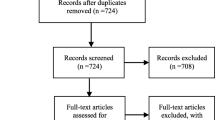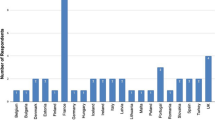Abstract
The objective of this study was to review the design and delivery of medical ethics (ME) education within medical programs across Australia and New Zealand (ANZ), how current teaching has been informed by the proposed core curriculum published in 2001 by the ATEAM (Braunack-Mayer et al. 2001) and how it could look moving forward. We conducted a mixed methods study using an online questionnaire consisting of 51 items. This included both binary and open-ended questions to categorise and explore similarities and differences in medical ethics curricula in medical programs accredited by the Australian Medical Council (AMC) across ANZ. Participants were asked about curriculum design format, duration, goals, assessments, content areas of their own ME curriculum. Convenors from 18 universities responded (78%). The main commonality was that ME curricula were integrated both longitudinally and laterally with other content. There was also commonality in content areas addressed. The goals, format, educators, and assessments of the ME curricula were highly variable. Most respondents described a curriculum which prioritised knowledge and skill development related to ME. Although the core goals of including knowledge, skills, and attitudinal development in ME curricula are still present, there is no uniformity in terms of format, delivery, or assessment across medical programs in ANZ. This is an area for collaborative development.





Similar content being viewed by others
References
[GMC] Graduate Medical Council. 2018. Outcomes for graduates 2018. London: Graduate Medical Council.
[MBOA] Medical Board of Australia. 2014. Good medical practice: A code of conduct for doctors in Australia. Australian Health Practitioner Regulation Agency.
[PMCA] Postgraduate Medical Councils of Australia. 2012. Australian curriculum framework for junior doctors. Australian Health Practitioner Regulation Agency.
Ashcroft, R., D. Baron, S. Benstar, S. Bewley, K. Boyd, J. Caddick, A. Campbell, A. Cattan, G. Claden, A. Day, et al. 1998. Teaching medical ethics and law within medical education: A model for the UK core curriculum. Consensus statement by teachers of medical ethics and law in UK medical schools. Journal of Medical Ethics 24 (3): 188–192.
Barnhoorn, B.C., M. Houtlosser, M.W. Ottenhoff-de Jonge, et al. 2019. A practical framework for remediating unprofessional behavior and for developing professionalism competencies and a professional identity. Medical Teacher 41 (3): 303–308. https://doi.org/10.1080/0142159X.2018.1464133.
Braunack-Mayer, A.J., L.H. Gillam, E.F. Vance, G.R. Gillett, I.H. Kerridge, J. McPhee, P. Saul, D.E. Smith, H.M. Wellsmore, B. Koczwara, et al. 2001. An ethics core curriculum for Australasian medical schools. The Medical Journal of Australia 175 (4): 205–210.
Brooks, L., and D. Bell. 2017. Teaching, learning and assessment of medical ethics at the UK medical schools. Journal of Medical Ethics 43 (9): 606–612.
Campbell, A.V., J. Chin, and T.C. Voo. 2007. How can we know that ethics education produces ethical doctors? Medical Teacher 29 (5): 431–436.
Carrese, J.A., J. Malek, K. Watson, L.S. Lehmann, M.J. Green, L.B. McCullough, G. Geller, C.H. Braddock III, and D.J. Doukas. 2015. The essential role of medical ethics education in achieving professionalism: The Romanell report. Academic Medicine 90 (6): 744–752.
DuBois, J.M., and J. Burkemper. 2002. Ethics education in U.S. medical schools: A study of syllabi. Academic Medicine 77 (5): 432–437.
Eckles, R.E., E.M. Meslin, M. Gaffney, and P.R. Helft. 2005. Medical ethics education: Where are we? Where should we be going? A review. Academic Medicine 80 (12): 1143–1152.
Englander, R., T. Flynn, S. Call, C. Carraccio, L. Cleary, T.B. Fulton, M.J. Garrity, S.A. Lieberman, B. Linderman, M.L. Lypson, et al. 2016. Toward defining the foundation of the MD degree: Core entrustable professional activities for entering residency. Academic Medicine 91 (10): 1352–1358.
Frank, J.R., L. Snell, and J. Sherbino, eds. 2015. CanMEDS 2015 physician competency framework. Ottawa: Royal College of Physicians and Surgeons of Canada. http://canmeds.royalcollege.ca/uploads/en/framework/CanMEDS%202015%20Framework_EN_Reduced.pdf. Accessed 10 Jun 2020.
Friedrich, O., K. Hemmerling, K. Kuehlmeyer, S. Nortemann, M. Fischer, and G. Marckmann. 2017. Principle-based structured case discussions: Do they foster moral competence in medical students? - a pilot study. BMC Medical Ethics 18 (1): 21.
Giubilini, A., S. Milnes, and J. Savulescu. 2016. The medical ethics curriculum in medical schools: present and future. Journal of Clinical Ethics 27 (2): 129–145.
Goldie, J. 2013. Identity formation in medical students: Elaboration of a previous conceptualization and review of the literature. Medical Education World 2: 1–23.
Hafferty, F.W., and R. Franks. 1994. The hidden curriculum, ethics teaching, and the structure of medical education. Academic Medicine 69 (11): 861–871.
Holden, M., E. Buck, J. Luk, et al. 2015. Professional identity formation: Creating a longitudinal framework through TIME (Transformation in Medical Education). Academic Medicine. 90 (6): 761–767. https://doi.org/10.1097/ACM.0000000000000719.
Hren, D., M. Marusic, and A. Marusic. 2011. Regression of moral reasoning during medical education: Combined design study to evaluate the effect of clinical study years. PLoS ONE 6 (3): e17406. https://doi.org/10.1371/journal.pone.0017406.
Kleinman, C.S. 2006. Ethical drift: When good people do bad things. JONA'S Healthcare Law, Ethics and Regulation 8 (3): 72–76.
Lakhan, S.E., E. Hamlat, T. McNamee, and C. Laird. 2009. Time for a unified approach to medical ethics. Philosophy, Ethics, and Humanities in Medicine 4 (1): 13.
Lehmann, L.S., W.S. Kasoff, P. Koch, and D.D. Federman. 2004. A survey of medical ethics education at U.S. and Canadian medical schools. Academic Medicine 79 (7): 682–689.
Lomis, K., J.M. Amiel, M.S. Ryan, and K. Esposito. 2017. Implementing an entrustable professional activities framework in undergraduate medical education: Early lessons from the AAMC core entrustrable professional activities for entering residency pilot. Academic Medicine 92 (6): 765–770.
Stirrat, G.M. 2015. Reflections on learning and teaching medical ethics in UK medical schools. Journal of Medical Ethics. 41 (1): 8–11.
Stoof, A., Martens, R. L., Van Merriënboer, J. J. G., Bastiaens, T. J. 2002. The boundary approach of competence: a constructivist aid for understanding and using the concept of competence. Human Resource Development Review 1: 345–365. https://doi.org/10.1007/BF02319856
Torda A. 2018. Exploring immersive learning – Challenging students to incorporate emotion and experience into learning. Presented at: UNSW learning and teaching forum: Partners in learning, connecting communities.
Yule, S., D. Rowley, R. Flin, N. Maran, G. Youngson, J. Duncan, and S. Paterson-Brown. 2009. Experience matters: Comparing novice and expert ratings of non-technical skills using the NOTSS system. ANZ Journal of Surgery 79 (3): 154–160.
Author information
Authors and Affiliations
Corresponding author
Ethics declarations
Declaration of interest
The authors report no declarations of interest.
All authors had full access to all of the data in the study.
Additional information
Publisher’s note
Springer Nature remains neutral with regard to jurisdictional claims in published maps and institutional affiliations.
Main points:
• ME is an essential component of medical courses in Australia and New Zealand. Although there was some commonality in learning outcomes, and integration with other content, there are a wide variety of approaches in ME curricula design, delivery, and assessment.
• Many ME curricula now also include responsibility for the development and assessmetn of the competency of ‘Professionalism’.
• The wide variability of design, format, delivery and assessment in ME curricula suggests a need for evidence about best practice in this area of medical education.
• Although there is general consensus about goals, ANZ medical programs would benefit from both collaborative evaluation of the different ME curricula, and the development of a common taxonomy or reference set of ANZ competencies as a framework for curricular design.
Rights and permissions
About this article
Cite this article
Torda, A., Mangos, J.G. Medical ethics education in Australian and New Zealand (ANZ) medical schools: a mixed methods study to review how medical ethics is taught in ANZ medical programs. International Journal of Ethics Education 5, 211–224 (2020). https://doi.org/10.1007/s40889-020-00097-w
Published:
Issue Date:
DOI: https://doi.org/10.1007/s40889-020-00097-w




